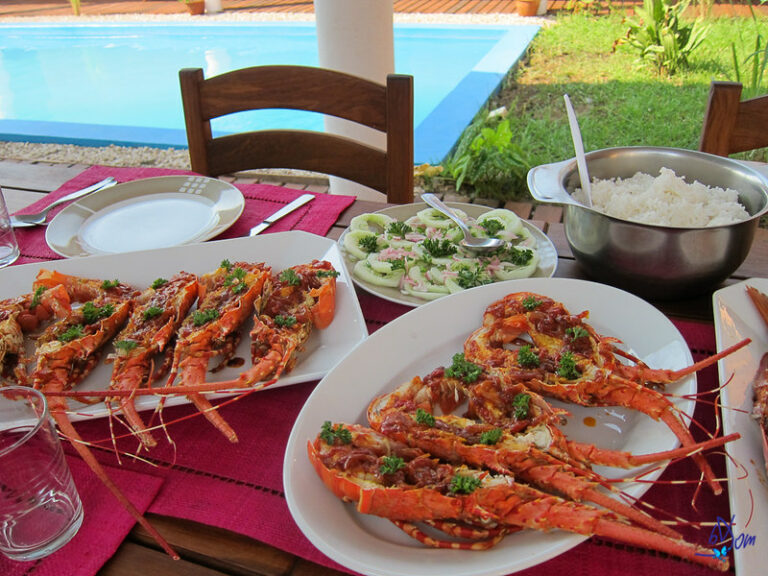Introduction: Malagasy Cuisine
Malagasy cuisine is heavily influenced by the island nation’s unique geography, history, and cultural traditions. Located off the southeast coast of Africa, Madagascar is home to a diverse range of ecosystems and agricultural practices, ranging from rice paddies and vanilla plantations to coastal fisheries and cattle ranches. Malagasy food is known for its bold and complex flavors, incorporating a variety of spices, herbs, and aromatics.
As tourism and international trade continue to grow in Madagascar, there is a growing interest in promoting sustainable and locally sourced ingredients in Malagasy cooking. By supporting local producers, promoting biodiversity, and minimizing environmental impact, Malagasy cuisine can help preserve and celebrate the island’s rich culinary heritage for future generations.
Sustainable Ingredients in Malagasy Cooking
Across the globe, consumers and chefs alike are increasingly concerned with the environmental and social impacts of their food choices. In Malagasy cooking, there is a growing focus on using sustainable ingredients that are grown or harvested in an environmentally responsible manner. This includes utilizing organic farming practices, preserving local biodiversity, reducing food waste, and minimizing carbon emissions.
Some examples of sustainable ingredients commonly used in Malagasy cuisine include rice, seafood, and a variety of fruits and vegetables. Rice, in particular, is a staple of Malagasy cuisine and is often grown on small-scale farms using traditional methods. By supporting these local farmers and preserving heirloom rice varieties, Malagasy cuisine can help promote sustainable agriculture practices in the region.
Supporting Local Producers in Malagasy Cuisine
In addition to promoting sustainable ingredients, Malagasy cuisine is also focused on supporting local producers and artisans. By sourcing ingredients from nearby farms and markets, chefs can help support the local economy and reduce the carbon footprint of their food. Additionally, by working closely with local producers, chefs can gain a deeper understanding of the ingredients they are using, ensuring that they are of the highest quality and are handled in a sustainable and responsible manner.
One example of this is the use of vanilla in Malagasy cuisine. Madagascar is the world’s leading producer of vanilla, and the spice is an integral part of many Malagasy dishes. However, vanilla farming can have a negative impact on the environment if not managed responsibly. By working with local vanilla farmers and promoting sustainable farming practices, Malagasy chefs can help ensure that this important ingredient is produced in a way that benefits both the environment and the local economy.
Traditional Malagasy Ingredients and Their Impact on Sustainability
Many traditional Malagasy ingredients are inherently sustainable, having been used for generations in a way that supports local ecosystems and promotes biodiversity. For example, the use of zebu (a type of cattle) in Malagasy cuisine is a vital part of the island’s cultural heritage. Zebu are raised in small-scale, family-run farms and are a source of meat, milk, and leather. By preserving these traditional farming practices, Malagasy cuisine can help promote sustainable agriculture and support local livelihoods.
Another example is the use of wild greens and herbs in Malagasy cooking. These plants are often foraged from nearby forests and fields, helping to preserve local ecosystems and promote biodiversity. By incorporating these ingredients into their dishes, Malagasy chefs can support sustainable agriculture and promote the use of local, wild ingredients.
The Role of Locally-Sourced Ingredients in Malagasy Food Culture
In addition to their environmental and economic benefits, locally-sourced ingredients also play an important role in Malagasy food culture. The island’s diverse ecosystems and cultural traditions have led to a wide variety of regional cuisines, each with their own unique ingredients and flavors. By utilizing locally-sourced ingredients, Malagasy chefs can help preserve and celebrate these regional culinary traditions, promoting a sense of pride and identity within local communities.
Furthermore, the use of locally-sourced ingredients can help create a deeper connection between consumers and the food they eat. By knowing where their food comes from and who produces it, diners can develop a greater appreciation for the ingredients and the people who work to bring them to the table.
Conclusion: Encouraging Sustainable and Local Practices in Malagasy Cooking
As the world becomes increasingly focused on sustainability and environmental responsibility, Malagasy cuisine is poised to play an important role in promoting these values. By utilizing sustainable and locally sourced ingredients, Malagasy chefs can help preserve the island’s rich culinary heritage while also promoting sustainable agriculture and supporting local producers. Through these efforts, Malagasy cuisine can help ensure a brighter future for both the island’s people and its ecosystems.

